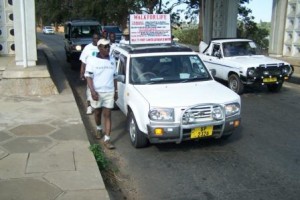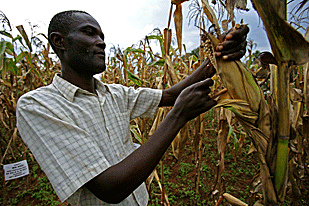Participants in the Health and Civic Research Initiative Ltd (HACRI Ltd) Big Walk for Cancer raised their heart rates to raise money for blood cancer patients on Saturday, May 26, walking just over 60km in 13 hours from Zomba Central Hospital to Upper Stadium in Blantyre.

The Big Walk kicked off from Zomba Central at 2 a.m. Saturday morning accompanied by a police traffic vehicle, and continued along the highway to the route end-point at Upper Stadium where a raffle and live entertainment were on offer. Two less rigorous walks also took place with a second group walking the Zomba-Blantyre route in turns with an accompanying vehicle and a third group heading to the end-point from Blantyre Town Hall.
According to Dr. Yohannie Mlombe, the University of Malawi College of Medicine physician who fronted the walk, the fundraising effort was inspired by the loss of late Malawian blood cancer patient Peter Kaunyolo and aimed to raise money “to support various blood cancer activities and cancer activities in general.”
At press time Mlombe reported that a total of K2,179,886 in donations had been collected and that the final amount was yet to be tabulated.
While Mlombe termed the event a success, he said they fell shy of their predetermined target.
“Our target was K25,000,000; we did not raise enough,” he said. “Devaluation also reduced the value of our collections.”
To meet their K25,000,000 target, Mlombe said HACRI Ltd will organise more events including a “garage sale” in July and a second-annual Big Walk.
What is blood cancer?
“Cancer is basically an abnormal growth of cells,” Mlombe said leading up to the weekend event. “Blood cells are prone to becoming cancerous because blood cells are constantly dying and being replaced. Everyday our bodies must make billions of blood cells. With such a busy ‘factory’ the probability of things going wrong is very high.
“Blood cells have three major functions depending on their type; they carry oxygen to the body, they fight infection and they help blood to clot. With blood cancers these functions are disturbed and patients present with severe infections, severe lack of oxygen and life threatening bleeding.
“The most aggressive (blood cancers) kill the patient within weeks of diagnosis.”
Blood cancer in Malawi
According to Mlombe, “recovery rates are dismal” in Malawi “since effectively no treatment is available.”
“Patients with aggressive blood cancer in Malawi always die within weeks of diagnosis,” he said. “Those with mild blood cancers live longer but progress fairly quickly and die because definitive diagnosis and treatment even of the mild blood cancers is not available in Malawi. All blood cancers in Malawi, particularly among adults, run a natural course as treatment is not available. Of all the patients that I have directly managed in Malawi with aggressive cancers, 23 in total have died within weeks of diagnosis.
“The latest of these is a 24-year-old young man called Peter Kaunyolo, who died on March 10, 2012. Prior to his illness he was a healthy, strong young man. It is always painful to hopelessly watch these people face agonizing and certain death, especially knowing that I could do something for them but I can’t primarily because systems are not in place to care for them.
“Currently there is a patient from Dedza who has an acute leukemia and we cannot even confirm the type of leukemia that he has; as time goes without doing anything for him, my frustration and hopelessness grows.”
“No systems in place”
While Mlombe said that Malawians can get treatment for mild blood cancers at any hospital in Malawi in theory, and that Kamuzu Central Hospital and Queen Elizabeth Central Hospital (QECH) have haematology clinics, “in practice there may be limitations in terms of clinical experience with treating these cancers in health facilities in the country.”
“For aggressive blood cancers one would have to have the services of a clinical haematologist available to them in a private hospital in order to access appropriate treatment,” he added. “Treating aggressive blood cancers is complicated because it is like having to repair the engine of a car while the engine is running. We need bone marrow for survival and yet the treatment for aggressive blood cancers requires that the bone marrow be wiped out first before replacement marrow can grow back or can be transplanted.
“It is the support that the patient needs while their bone marrow is down which is problematic in Malawian public hospitals,” he said, noting that support is required to fight infection, maintain oxygen carrying capacity and prevent severe bleeding. “These patients need a kind of intensive care unit where each patient has a self-contained room. For this reason, general oncology wards like the one that is currently available at QECH are unsuitable for the management of aggressive blood cancers like acute leukaemias.”
The Health and Civic Research Initiative
To help ensure equal opportunity for all Malawians to access health services, Mlombe said HACRI Ltd hopes to fund a dedicated haematology outpatient unit and an acute leukemia ward at a central hospital with the monies raised from the walk.
“Malawi is also one of only 24 countries in the world that does not have a radiotherapy machine,” he said. “We would like to address this issue as well as the issue of a national cancer policy among other cross-cutting cancer issues.”
According to the HACRI Ltd letter inviting sponsors to donate to the Big Walk, a dedicated haematology outpatient unit and an acute leukemia ward at QECH “would allow outpatient provision of services such as regular blood transfusions, diagnostic procedures and administration of chemotherapy (cancer drugs)” and “required diagnostic tests”, a radiotherapy centre could be “used to manage about 60 percent of cancers” because “for some cancers, radiotherapy is the only effective treatment”, and a national cancer policy would allow for “a unified approach to cancer prevention and management”.
The HACRI Ltd letter also states that funds raised could target a national population-based cancer registry, carry out cancer research, and establish the patient assistance programme for cancer patients in Malawi.
“A global patient assistance programme called GLIVEC International Patient Assistance Program (GIPAP) provides a free drug to poor patients with a form of blood cancer called Chronic Myeloid Leukaemia (CML) in Malawi,” reads the letter. “The drug costs from K500,000 to K1 million for a one-month dosage. As of current clinical practice, patients must take this drug for life. However, for patients to receive this drug free, they must undergo a blood test to confirm CML. This test is not available in Malawi.
“It costs about K70,000 to K90,000 to have a blood sample sent to South Africa by DHL and obtain results,” the letter continues. “The vast majority of our patients cannot afford this amount. In addition, currently (January 2012) K5,000 is required as a Malawi Revenue Authority processing fee when the drug donation arrives in the country… We would like to set up a patient assistance program to help these kinds of needs.”
According to Mlombe, HACRI Ltd will be using the donations that have been collected so far to “immediately set up the patient assistance programme to help give advice and help with some expenses for cancer patients.”
“Cancer patients are a minority in our environment, so their needs are neglected in order to ensure that the available limited resources treat as many patients as possible,” he said. “But every human being, no matter how poor, has a right to dignity and there is nothing more dehumanizing than facing certain death in pain alone.”
Patients who have no medical scheme and require assistance with blood cancers – leukaemias, lymphomas, myelodysplastic syndromes, myeloproliferative neoplasms, lymphoproliferative neoplasms, etc. – can email patients@hacri.org.



.jpeg&w=60&q=100&h=60)








